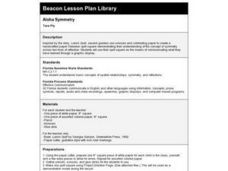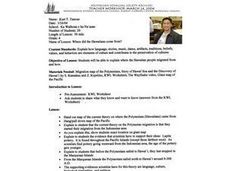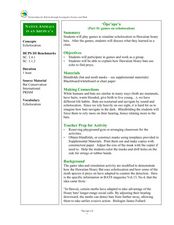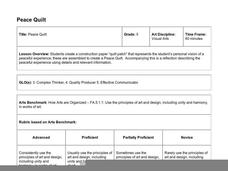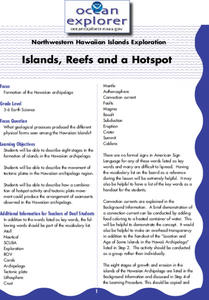Curated OER
Roots of the Hawaiian Hotspot
Learners explain the processes of plate tectonics and volcanism that resulted in the formation of the Hawaiian Islands. They describe, compare, and contrast S waves and P waves. They explain how
Curated OER
Aloha Symmetry
Students create handcrafted paper Hawaiian quilt squares. They do this to show the concept of symmetry across two lines of reflection.
Curated OER
Where Did the Hawaiians Come From?
Fourth graders listen to the current theory on where Polynesians came from. They watch the video, The Wayfinder, and write a paper addressing where the Hawaiians came from and how.
Curated OER
Games on Echolocation
Get a little batty with life science! This fun simulation game replicates how bats use echolocation to hunt moths in their native Hawaiian habitat. After creating blind folds and discussing some basic principles of echolocation, students...
Channel Islands Film
Island Rotation: Lesson Plan 3
How far have California's Channel islands moved? What was the rate of this movement? Class members first examine data that shows the age of the Hawaiian island chain and the average speed of the Pacific Plate. They then watch West of the...
Hawaiʻi State Department of Education
When We Are A Story
Drama and story elements go hand-in-hand. Have the class dive into a dramatic play to show character intention, conflict resolution, main events, and the dialogue in a Hawaiian folk tale. They read the story, then group-up to discuss and...
Curated OER
Life Cycle of Hawaii's Honu
Students simulate the life cycle of Hawaii's Honu. In this Science lesson, students act out the life cycle of the Hawaiian sea turtle. Students determine and play the roles of prey and predator.
Curated OER
What is an Ahupua'a?
Students research ahupua'a ecosystems. For this ahupua'a lesson, students explore how land is subdivided in Hawaii and the effect on the ecosystem. Resources are provided.
Curated OER
Ancient Hawaiian Sports
Students discover what types of sports were popular in ancient Hawaii. They investigate the rules for playing the games no longer common in Hawaii. After researching the sports, students play the games and design posters representative...
Hawaiʻi State Department of Education
Dance in Hawai`i
Nearly every people group has some type of dance, and those dances usually reflect history and culture. Little researchers write an essay on the cultural significance of the Hawaiian hula dance. They research the role of the hula dancer...
American Documentary
American Aloha: Hula Beyond Hawai'i
In this activity, high schoolers will examine Hawaii's issues of colonization, authority, authenticity and cultural identity, and understand the distinction between native and non-native Hawaiians. This activity includes links to videos,...
Hawaiʻi State Department of Education
Peace Quilt
Learners explore color, shape, line, balance, radial symmetry, unity, repetition, and pattern as they make a peace quilt inspired by those made by Hawaiian women in the 1800s. After learning a bit about the history or peace quilts, the...
Curated OER
Islands, Reefs, and a Hotspot
Learners describe eight stages in the formation of islands in the Hawaiian archipelago. They examine the movement of tectonic plates in the Hawaiian archipelago region, and describe how plate movement produced the Hawaiian archipelago.
Curated OER
Seals, Corals, and Dollars...
Students explore the interdependence of animals and their habitat. In this Hawaiian ecology lesson, students work in groups to research the necessity of preserving precious coral as a habitat for monk seals. Students prepare and share...
Curated OER
Hawaiian Bird Beak Adaptation
Learners explore adaptation by participating in a lab activity. In this bird characteristics lesson, students discuss the different purposes birds have for their beaks and conduct an experiment testing which beaks collect food best....
Curated OER
Lesson 12: Ho'olaulima: Let's Make a Hawaiian Garden
Second graders grow a classroom garden that acts as a living laboratory for cross-curricular activities. In this classroom garden lesson, 2nd graders follow directions to build and plant a garden that is used to teach math, science, and...
Curated OER
Hawaiian Bowl!
Students describe the movement of tectonic plates in the Hawaiian archipelago region. They describe how a combination of hotspot activity and tectonic plate movement could produce the arrangement of seamounts obse
Curated OER
Na Wa'a o Ka Wa Kahiko me Na Wa'a o Keia Ao
Second graders research and discuss how traditional canoes were made and changed over time, identify parts of the canoe using Hawaiian and English vocabulary, and compare and contrast traditional and contemporary canoes.
Curated OER
Expressions of Culture, History and Politics Through Art and Music
Students analyze a piece of music to identify its political, cultural, and historical messages. They discuss relationships between art, history, culture and aesthetics and examine how Hawaiian artists transmit cultural traditions,...
Curated OER
Creation Mythology
Students construct a map from geographic data and explain relationships found in the information. Students identify ancient beliefs and customs through Hawaiian creation myths while comparing similarities and differences and appreciating...
Curated OER
Northwest Hawaiian Islands
Seventh graders identify the types of plants and animals on the Hawaiian Islands. They research information on sanctuaries. They analyze data on fish and fish resources in the area. They write a letter to the President explaining...
Hawaiʻi State Department of Education
Comparing Cultural Dances
All cultures express similar thoughts, feelings, and ideas. But, often times those things are expressed differently. Learners compare and contrast traditional dances from two cultures. They watch videos of each performance, stop to...
PBS
Breaking it Down
After challenging themselves to correctly choose the form of erosion and length of time required for a given landform to develop, earth science class members model mechanical and chemical weathering with various lab demonstrations over...
NOAA
The Biggest Plates on Earth
The deepest part of the ocean is the Marianas trench where two tectonic plates meet. Scholars explore plate tectonics and their boundary types by completing hands-on activities throughout the lesson. Specific areas, such as the Galapagos...
Other popular searches
- Hawaiian Music
- 8 Hawaiian Islands
- Hawaiian Culture
- Hawaiian Islands
- Hawaiian Marine Biology
- Hawaiian Ecosystem
- Hawaiian Studies
- Hawaiian History
- Hawaiian Dance
- Hawaiian Archipelago
- Hawaiian Music Activities
- Hawaiian Mythology



